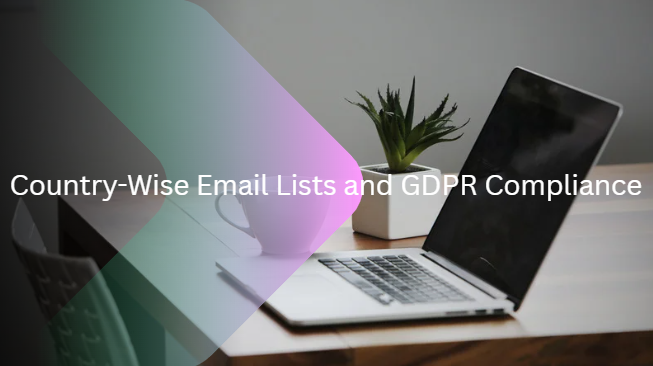The Role of GDPR in Managing Country-Specific Email Data
Country-Wise Email Lists and GDPR Compliance require marketers to implement strict data management practices tailored to each region’s regulatory environment. GDPR mandates explicit consent from recipients before sending marketing emails, meaning that every email address added to a list must have clear permission for contact. This consent should be freely country wise email marketing list given, specific, informed, and unambiguous. Additionally, GDPR enforces the principle of data minimization, requiring that only the necessary data for the intended purpose is collected and retained. For marketers managing email lists across multiple countries, this means carefully auditing their data sources to ensure that each contact’s information complies with GDPR’s standards. Moreover, recipients must be able to easily withdraw their consent at any time, making it essential to provide clear unsubscribe options in every email. Adhering to these principles helps businesses avoid penalties and maintains the integrity of their marketing efforts.

Best Practices for Creating and Using Country-Wise Email Lists
Creating Country-Wise Email Lists and ensuring GDPR Compliance involves adopting best practices that prioritize data quality and user rights. Marketers should source email addresses ethically, avoiding purchased or scraped lists, which often lack valid consent and increase the risk of non-compliance. Instead, building organic lists through transparent opt-in forms on websites, social media, and events encourages genuine engagement and higher quality leads. Segmenting lists by country allows for personalized content that aligns with local customs, language, and preferences, enhancing the overall effectiveness of campaigns. Maintaining up-to-date records and regularly cleansing the list by removing inactive or invalid contacts also contributes to GDPR compliance and improves deliverability. Employing reliable email marketing platforms with built-in compliance tools can further streamline data management and reporting processes, making it easier to meet GDPR obligations.
Navigating GDPR Challenges Across Different Countries
While GDPR applies to all EU member states, the enforcement and interpretation of its provisions can vary slightly by country, presenting challenges for marketers using Country-Wise Email Lists and striving for full GDPR Compliance. Some EU countries have additional local regulations or guidelines that supplement GDPR, requiring businesses to stay informed about national data protection authorities’ rulings. Beyond the EU, marketers must also be aware of other countries’ data privacy laws, such as Canada’s CASL or Brazil’s LGPD, which may have different consent requirements and penalties. This patchwork of regulations means that a one-size-fits-all approach to email marketing is risky. Instead, marketers should adopt a flexible strategy that respects each country’s legal framework and cultural expectations. Partnering with legal experts or data protection officers can help navigate these complexities and ensure campaigns remain compliant globally.
Monitoring and Improving Compliance for Sustainable Email Marketing
Sustaining Country-Wise Email Lists and GDPR Compliance is an ongoing process that requires continuous monitoring and improvement. Marketers should implement regular audits to review consent records, data security measures, and unsubscribe processes to identify and address potential compliance gaps. Tracking key performance indicators like bounce rates, complaint levels, and opt-out rates can also signal issues related to data quality or user satisfaction. Educating marketing teams about GDPR principles and best practices is essential to maintain a culture of privacy and responsibility. Additionally, staying updated on changes in data protection laws and adapting strategies accordingly ensures long-term compliance. By fostering transparent communication with subscribers and respecting their data rights, businesses not only avoid legal risks but also build loyal relationships that support sustainable email marketing success across different countries.